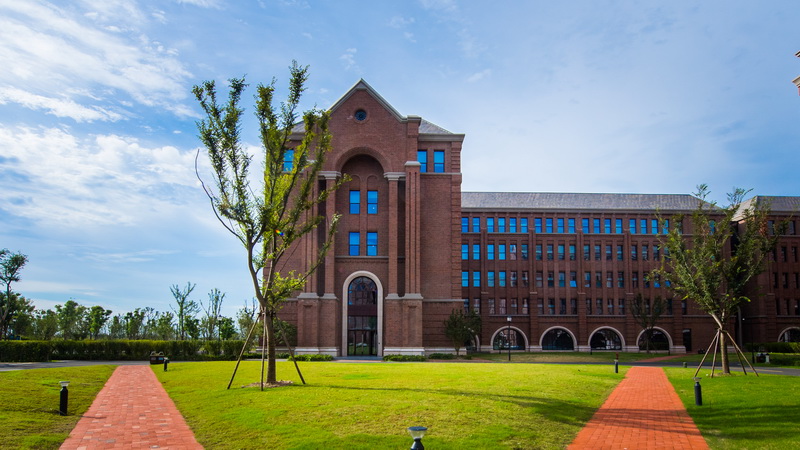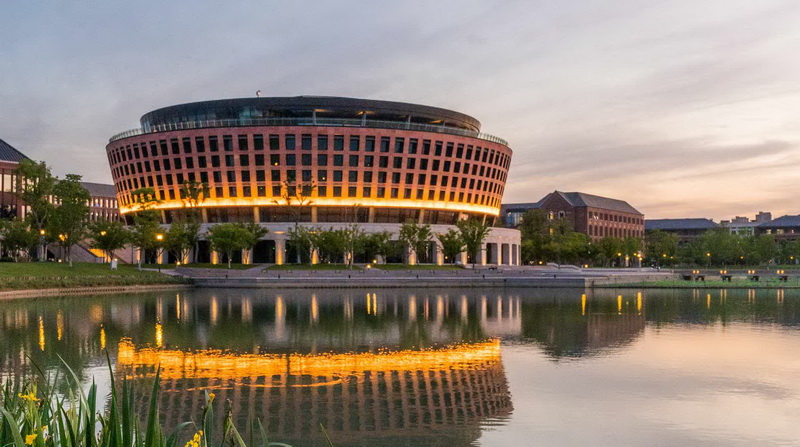Energy Conversion Systems
ME 400

Course Code
ME 400
Course Name
Energy Conversion Systems
Credit
3.0 - 3.0
Instructors
Parent ID
Semester (field_semester)
- Any -2016/2017 Fall Winter2016/2017 Spring Summer2017/2018 Fall Winter2017/2018 Spring Summer2018/2019 Fall Winter2018/2019 Spring Summer2019/2020 Fall Winter2019/2020 Spring Summer2020/2021 Fall Winter2020/2021 Spring Summer2021/2022 Fall Winter2021/2022 Spring Summer2022/2023 Fall Winter2022/2023 Spring Summer
Apply
2020/2021 Fall Winter
Lee, Timothy
Introduction
Processes and systems for energy conversion, including power and refrigeration cycles, air conditioning, thermoelectrics and fuel cells; ideal-gas mixtures and psychrometrics.
3 undergraduate hours. 4 graduate hours. Prerequisite: ME 200.
Engineering Materials
ME 330

Course Code
ME 330
Course Name
Engineering Materials
Credit
4.0 - 4.0
Instructors
Parent ID
Semester (field_semester)
- Any -2016/2017 Fall Winter2016/2017 Spring Summer2017/2018 Fall Winter2017/2018 Spring Summer2018/2019 Fall Winter2018/2019 Spring Summer2019/2020 Fall Winter2019/2020 Spring Summer2020/2021 Fall Winter2020/2021 Spring Summer2021/2022 Fall Winter2021/2022 Spring Summer2022/2023 Fall Winter2022/2023 Spring Summer
Apply
Introduction
Structures of polymers, metals, and ceramics as the basis for their mechanical behavior. Manipulation of structure through such processes as heat treatment and solidification. Mechanisms of material failure in service (yielding, fracture, fatigue, creep, corrosion, and wear) and simple design techniques to avoid these failures. Strategies for materials selection in design.
Credit is not given for both ME 330 and either CEE 300 or MSE 280. Prerequisite: CHEM 102 and TAM 251.
Students must register for one lab and one lecture section.
Engineering Orientation
ENGR 100

Course Code
ENGR 100
Course Name
Engineering Orientation
Credit
1.0 - 1.0
Instructors
Parent ID
Semester (field_semester)
- Any -2016/2017 Fall Winter2016/2017 Spring Summer2017/2018 Fall Winter2017/2018 Spring Summer2018/2019 Fall Winter2018/2019 Spring Summer2019/2020 Fall Winter2019/2020 Spring Summer2020/2021 Fall Winter2020/2021 Spring Summer2021/2022 Fall Winter2021/2022 Spring Summer2022/2023 Fall Winter2022/2023 Spring Summer
Apply
2021/2022 Fall Winter
李尔平, 胡欢, Demartino,Cristoforo
2020/2021 Fall Winter
Demartino, Cristoforo, 胡欢
2019/2020 Fall Winter
胡欢, 肖岩
2018/2019 Fall Winter
Philip, Krein
2017/2018 Fall Winter
Philip, Krein
Introduction
Orientation required of new freshmen in the College of Engineering.
Freshmen should enroll in the section corresponding to their major.
Exploring Arts and Creativity
FAA 110

Course Code
FAA 110
Course Name
Exploring Arts and Creativity
Credit
3.0 - 3.0
Instructors
Parent ID
Semester (field_semester)
- Any -2016/2017 Fall Winter2016/2017 Spring Summer2017/2018 Fall Winter2017/2018 Spring Summer2018/2019 Fall Winter2018/2019 Spring Summer2019/2020 Fall Winter2019/2020 Spring Summer2020/2021 Fall Winter2020/2021 Spring Summer2021/2022 Fall Winter2021/2022 Spring Summer2022/2023 Fall Winter2022/2023 Spring Summer
Apply
Introduction
High and street art, tradition and experimentation, the familiar and unfamiliar, international and American creativity provide this course's foundation. Students will attend performances and exhibitions, interact with artists, and examine core issues associated with the creative process in our increasingly complex global society. Faculty from the arts, sciences, humanities, and other domains will lead students through visual arts, music, dance, and theatre experiences at Krannert Center and Krannert Art Museum to spark investigation and dialogue.
Fabrication lab emphasizing physical theory and design of devices suitable for integrated circuitry
ECE 444

Course Code
ECE 444
Course Name
Fabrication lab emphasizing physical theory and design of devices suitable for integrated circuitry
Credit
4.0 - 4.0
Instructors
Parent ID
Semester (field_semester)
- Any -2016/2017 Fall Winter2016/2017 Spring Summer2017/2018 Fall Winter2017/2018 Spring Summer2018/2019 Fall Winter2018/2019 Spring Summer2019/2020 Fall Winter2019/2020 Spring Summer2020/2021 Fall Winter2020/2021 Spring Summer2021/2022 Fall Winter2021/2022 Spring Summer2022/2023 Fall Winter2022/2023 Spring Summer
Apply
Introduction
Fabrication lab emphasizing physical theory and design of devices suitable for integrated circuitry; electrical properties of semiconductors and techniques (epitaxial growth, oxidation, photolithography diffusion, ion implantation, metallization, and characterization) for fabricating integrated circuit devices such as p-n junction diodes, bipolar transistors, and field effect transistors.
4 undergraduate hours. 4 graduate hours. Prerequisite: ECE 340.
Formal Software Devel Methods
CS 477

Course Code
CS 477
Course Name
Formal Software Devel Methods
Credit
3.0 - 4.0
Instructors
Parent ID
Semester (field_semester)
- Any -2016/2017 Fall Winter2016/2017 Spring Summer2017/2018 Fall Winter2017/2018 Spring Summer2018/2019 Fall Winter2018/2019 Spring Summer2019/2020 Fall Winter2019/2020 Spring Summer2020/2021 Fall Winter2020/2021 Spring Summer2021/2022 Fall Winter2021/2022 Spring Summer2022/2023 Fall Winter2022/2023 Spring Summer
Apply
Introduction
Mathematical models, languages, and methods for software specification, development, and verification.
Same as ECE 478. 3 undergraduate hours. 3 or 4 graduate hours. Prerequisite: CS 225; CS 373 or MATH 414.
Foundation of Economics
ECON 101

Course Code
ECON 101
Course Name
Foundation of Economics
Credit
3.0 - 3.0
Instructors
Parent ID
Semester (field_semester)
- Any -2016/2017 Fall Winter2016/2017 Spring Summer2017/2018 Fall Winter2017/2018 Spring Summer2018/2019 Fall Winter2018/2019 Spring Summer2019/2020 Fall Winter2019/2020 Spring Summer2020/2021 Fall Winter2020/2021 Spring Summer2021/2022 Fall Winter2021/2022 Spring Summer2022/2023 Fall Winter2022/2023 Spring Summer
Apply
2022/2023 Fall Winter
叶兵
2021/2022 Spring Summer
叶兵
2021/2022 Fall Winter
Penkov,Oleksiy, 夏焕新
2019/2020 Spring Summer
叶兵
2018/2019 Fall Winter
王志凯, 叶兵
Introduction
<p>General survey of the operation of the economic system; Students with credit in ECON 102 or ECON 103 may receive 2 hours credit in ECON 101. Students with credit in both ECON 102 and ECON 103 may not receive credit for ECON 101. This course satisfies the General Education Criteria for: Social & Beh Sci - Soc Sci</p>
Frameworks for Inequality
GCL 200

Course Code
GCL 200
Course Name
Frameworks for Inequality
Credit
3.0 - 3.0
Instructors
Parent ID
Semester (field_semester)
- Any -2016/2017 Fall Winter2016/2017 Spring Summer2017/2018 Fall Winter2017/2018 Spring Summer2018/2019 Fall Winter2018/2019 Spring Summer2019/2020 Fall Winter2019/2020 Spring Summer2020/2021 Fall Winter2020/2021 Spring Summer2021/2022 Fall Winter2021/2022 Spring Summer2022/2023 Fall Winter2022/2023 Spring Summer
Apply
2021/2022 Fall Winter
无
Introduction
Frameworks for Inequality
From Idea to Enterprise
TE 250

Course Code
TE 250
Course Name
From Idea to Enterprise
Credit
2.0 - 2.0
Instructors
Parent ID
Semester (field_semester)
- Any -2016/2017 Fall Winter2016/2017 Spring Summer2017/2018 Fall Winter2017/2018 Spring Summer2018/2019 Fall Winter2018/2019 Spring Summer2019/2020 Fall Winter2019/2020 Spring Summer2020/2021 Fall Winter2020/2021 Spring Summer2021/2022 Fall Winter2021/2022 Spring Summer2022/2023 Fall Winter2022/2023 Spring Summer
Apply
Introduction
Fundamentals of technology entrepreneurship and critical areas of the entrepreneurship process: creating a successful startup and transforming it into a sustainable business, validating an idea and taking it to market, evaluation of new ideas, forming high-performance teams, and financing a technology-based startup. Field trips to local startups, businesses, the University Research Park, and Enterprise Works incubator included along with in-depth case studies, and a hands-on class project.
Fundamentals of Env Sci
NRES 100

Course Code
NRES 100
Course Name
Fundamentals of Env Sci
Credit
3.0 - 3.0
Instructors
Parent ID
Semester (field_semester)
- Any -2016/2017 Fall Winter2016/2017 Spring Summer2017/2018 Fall Winter2017/2018 Spring Summer2018/2019 Fall Winter2018/2019 Spring Summer2019/2020 Fall Winter2019/2020 Spring Summer2020/2021 Fall Winter2020/2021 Spring Summer2021/2022 Fall Winter2021/2022 Spring Summer2022/2023 Fall Winter2022/2023 Spring Summer
Apply
Introduction
Introduction to environmental sciences and current environment issues. Topics include population growth, world food supplies, agriculture and the environment, biodiversity, fossil fuels and "green" energy issues, endangered and threatened species, water use, conservation and pollution, global warming, acid rain, ozone depletion, waste management and reduction, recycling, toxins and health, mineral resources, and environmental policies and regulations.





